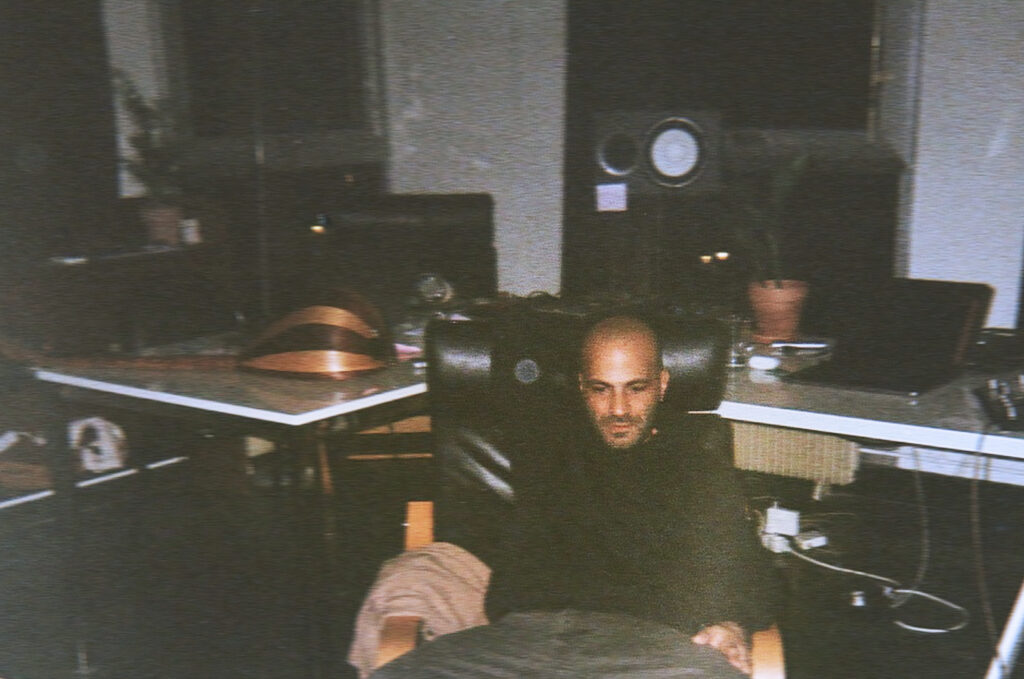Wind, Again is an intoxicating album of deep complexity and nuance. Based between France and Lebanon, the architect of this work, Sary Moussa, has created an interplay between the micro and macro within complicated landscapes. With both Western and West Asian instruments and deftly hewn, jagged electronics, he oscillates between collective experience and the deeply personal. This album is an exploration of how we occupy the real and unreal nature of place individually and collectively. It is about the stories we choose to tell. It creates ecologies that reject ego-driven narratives of a lone composer calling all the shots. Wind, Again feels, to me, like crucial listening. The album flings a door wide open inviting radical change, disruption and abstract beauty. It is a nuanced and cavern-deep conversation.
The tracks are both muscular and sinuous in flow. The guest musicians are seemingly in a call-and-response series of movements but never fully intertwined. Moussa manages to engender a feeling of merging whilst being apart, a collecting and dispersing of communal energies. Rather like a Rorschach image, we see multiple things at different times. There is a sense of weight, the energetic fields of each artist as well as Moussa himself altering the states from which we listen.
Moussa’s album feels like it is a beast that resides in hinterlands, places on and off the map. It is rich, confronting, and keeps a taut centre line. It rolls deep, is alchemical, and, we are told, “fuelled by the cultural, social, and personal realities that Moussa was brought up and lives in”. It feels in part like an elicitation to the listener to remove our blinkers and consider our own narrow frames of reference.
The track ‘Violence’, for instance, creeps up on you so gently and stealthily it feels as if you are swept up in the culmination of a slow, sorrowful, harmonious lament. As it starts to build momentum you sense a burgeoning collection of icicle-like shards within the spokes, discombobulating in its slow-motion effect, which then ultimately splinters into discordant pieces as it reaches its dissolve.
‘White Dust’ is the track where all fractures feel as if they are searched out. A fast-developing vortex seems to gain momentum in the desert, harnessing tumbleweed, scattering its seeds but leaving its crucial root system behind to take root again somewhere else. One can hear the wind rattle against wires, surging through the fabric of ruined buildings. It feels both harmonic and discordant as if it had just arrived in a place that is brittle, where sudden change lurks within, ready to spring in its menace.
On ‘I Will Never Write A Song About You’, each of the musicians initially responded to the foundations of a track that no longer exists, which was subsequently deleted by Moussa, creating an entirely experimental piece that not only works but is majestic in its subtle complexities. We hear at least three ley lines snake and converge. Julia Sabra opens with intimate rolled piano chords pittering like the start of rainfall, followed by Paed Conca on swooning clarinet and Abed Kobeissi on buzuk. Moussa lights a match then stands back as the listeners expectations burn, creating something which pulses, eddies, swells and subverts.
Wind, Again undulates, sidewinds and softly hisses through industrial terrain. It agitates the viewfinder as it bridges the traditional and the new. It is both stingingly bold and catch-in-the-throat evocative without using cliché or saccharine motifs designed to elicit emotions. Instead, you are pulled into the undertow, into a dreamscape of echoes and strange forms coupled with the sudden brutality of the present – mechanically distant yet closely resonant.
And yet ‘Everything Inside A Circle’ feels like the gentle opening of an origami finger box, ready to let everything else fall away as we wait and watch. Moussa’s vocals begin to tiptoe in, bringing us to a strange sense of stillness. We feel a tender intimacy here before it veers off into something else and distorts. This memory of sitting with his mother in a car as a child soon turns into smoke, leading us somewhere else which in turn reflects how one memory triggers many things.
Upon listening to ‘A Storm, A Gift’, I feel knocked off my feet. It is the dystopian cloak that wraps the album up. Moussa manages to create something here that is both disquieting, strangely thrilling, and also stealthily wraith-like. He becomes an accomplished sorcerer of thresholds, bringing us to spaces that are shapeshifting, alarming and epic. I first hear this track on the road, and everyone in the vehicle I am in suddenly falls silent and brings forth a chilling sombreness. Unexpected sudden tears are brought forth. This track could have only come from a first-hand understanding of fractured landscapes, a sense of awe, and the brutal scars that conflict and displacement brings. I close my eyes and imagine it occupying a venue like the Turbine Hall or an aircraft hangar: potent, beckoning and utterly bewitching. This is music meant for a great many to hear it, but equally as potent alone in the dark, rolling around one’s headphones. At this present time, I cannot ever imagine forgetting this body of work.
As this last track closes, I am reminded of the words of Lebanese-American artist, writer and polymath, Etel Adnan who wrote about the ‘in between’, about exile, war, identity and memory in her poetry collections, including Time. She speaks of how we inhabit both the real and the imagined in our memories. Her work is a reminder to not be blinded by the limited lens we look through, but to instead flip the script when you are deluged. “Walk on the perimeter / of your dreams it’s not / that the roads are blocked / but that the hearts have / given into the violence of the wind.”


